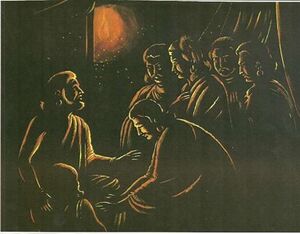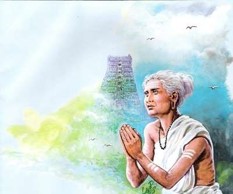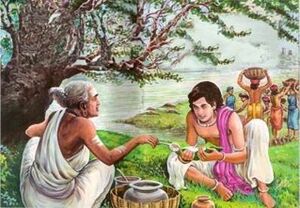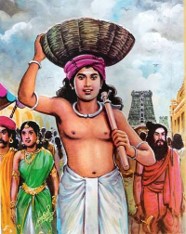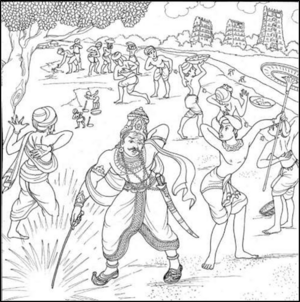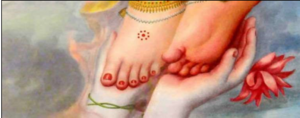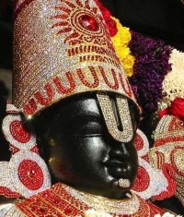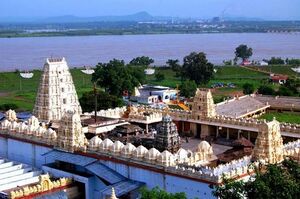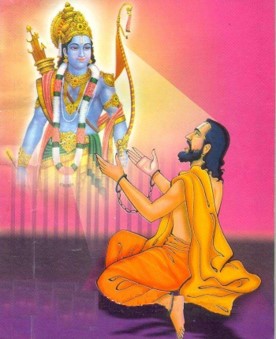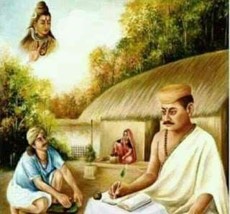Talk:Bhagavān bears His devotees and serves them
By Vishal Agarwal
In the Bhakti tradition, Bhagavan is not simply a Master, or Lord of the Universe but also a loving servant of his Bhakta-s. In a relationship of love, there is no high and low. In worldly relationships, there is a hierarchy, but in a relationship of love between the Bhakti Yogī and Bhagavan, each tries to please and help the other. This is described in the following verse of the Bhagavad Gita-
Those men who contemplate (or worship) Me directing their thoughts to Me, with no other thoughts, for them, who are constantly steadfast, I carry (or secure) both what they already have, and what they lack. Gita 9.22
A charming story is narrated from the life of a scholar who thought that it is demeaning to consider the Īshvara as a bearer of our burdens-
Story: Pandit Jagannātha Realizes that the Īshvara Bears our Burdens
Pandit Jagannatha Mishra was a famous scholar who resided in the holy town of Puri on the eastern coast of India. He resolved to write a commentary on the entire Mahabharata, which is also embedded in the Bhagavad Gita. One day, he came across the words “yogakshema vahāmyaham” (“I bear the yog and kshema of my devotee”). The Pandit thought to himself – “This seems to be a textual corruption that has been introduced into the Gita. I can understand that Īshvara will give (dada) yog and kshema to his devotee. But why should be ‘bear’ (vaha) for his devotees? So, he crossed out the letters ‘vahā’ and replaced them with ‘dadā’. He felt pleased that the words now read ‘yogakshema dadāmyaham’ which made more sense to him, and went to take a bath. While he was gone, a very handsome boy appeared on his doorstep, carrying a box of food. He gave it to the Pandit’s wife and said, “I learned that there was no food in your home today, and therefore I have brought some for you and your husband.” The wife looked at that handsome boy and noticed that there was a gash of injury caused recently on his perfect face. She asked him as to who had hit him. The boy replied, “It was Pandit Mishra-ji,” and then he left. The wife was very disturbed and when the Pandit returned from his bath, she was very annoyed with him. She said, “Looks like you have become senile with age. That poor boy carries food for us, and you are so cruel as to beat him and scar his face. Have you gone mad?” The Pandit replied, “I never hit any boy. But oh, I remember now! I had crossed out a word in my manuscript of the Gita and replaced it with another one. The Gita is verily the body of the Īshvara. And by carrying over food for us today, He has demonstrated that the Īshvara indeed bears yog and kshema for His devotees. He does not just give them to us, he indeed bears them for us as well![1]”
Some other stories in the Hindu tradition below show the Īshvara lovingly acting as a servant of His Bhakta-s:
Krishna Picks the Shoes of Draupadi
According to oral traditions, Bheeshma (the commander of the Kaurava army) also promised Duryodhana that he would kill at least 1 Pāṇdava on the following day. When the word reached the encampment of the Pāṇdavas, Draupadī grew worried for the safety of her husbands.
She prayed to Krishna, who immediately appeared in front of her and asked her to follow him in the dark to Bheeshma’s tent. As they were walking towards the camp, Krishna said to her, “Draupadī, your shoes, to which some anklets are stitched, are making a lot of sound and will wake up everyone. Why don’t you take them off here, and then enter that tent in front of us? That tent belongs to Bheeshma.”
Draupadi did as told and as soon as she entered the tent, she fell on the feet of Bheeshma. It was dark, and Bheeshma did not realize who it was. He automatically blessed the woman, “May you live a happy and long life with your husband.” Draupadi was elated, and she said, “It is I, Draupadī, the wife of your grandchildren, the Pāṇdavas. I am happy that you have given me this blessing because now I am sure that you will spare all the five Pāṇdavas!” Bheeshma smiled and said, “I am sure it was Krishna’s idea that you should come and get my blessing so that I spare your husbands. But where is He?” Bheeshma lit up a lamp and saw that Krishna was standing at the entrance of the tent. But something was dangling from his shoulders. Draupadi looked closely and was horrified, “Bhagavān, you should not have carried my shoes from the ground and slung them across your shoulders! We worship you and therefore, your act of picking my shoes with your hands and placing them on your shoulders will take me to hell.”
Krishna smiled and said, ‘Do not worry Draupadi, because I am always a servant of those Bhaktas like you who have surrendered themselves completely to me. I did not want any insect to get inside your sandals in the dark from the ground, and therefore I picked them up with my hands and put them across my shoulders.” Bheeshma was very moved when he noticed Krishna’s humility. He replied, “When the Pāṇdavas are protected by Bhagavān who will go to any extent to serve his Bhaktas, then there was no need for me to give a blessing to the Pāṇdavas. They were automatically protected by You, Krishna.” Bheeshma’s words came true, and on the 10th day of the war, he fell, while fighting against the Pāṇdavas.
Shri Rama feeds Swami Vivekananda
“Swami Vivekananda as a wandering monk (Parivrajaka) was once traveling by a train. The co-passenger was making fun of him all the while enjoying delicious food. Swamiji was no doubt hungry. But he had his mind fixed on Īshvara. At a particular station, they alighted to board another train. Swamiji chose to wait at a distant place under a tree’s shade until the next train arrived. He continued to be hungry; he did not have money to buy food. Meanwhile, in the town, Sri Rama appeared in the dream of a sweetmeat merchant who was enjoying his afternoon nap after a heavy lunch. Sri Rama woke him up and asked him to carry food to the Swamiji. Brushing it aside as but a dream, he slept once again. But Bhagavan woke him up again and sent him with food. The Swamiji was surprised. He asked the merchant if he was sure whether it was really to him that Sri Rama had sent the food. The merchant described the identity marks as told by Sri Rama in the dream. Swamiji’s grateful devotion to Īshvara knew no bounds.[2]”
In the Tamil Shaivite Hindu traditions, the following story is narrated-
Shiva comes as a Laborer to help an Old Lady
Semmana Devi was a great Bhakta of Bhagavān Shiva. She was poor and lived in a hut in a village that was on the banks of river Kaveri in south India. One day, the river became flooded. The King of the country ordered all citizens to provide labor to raise the banks of the river so that the villages did not get flooded.
As a good citizen, Semana Devi too wanted to help. But she was too old and weak. She prayed to Shiva, “Bhagavān, please provide me with help so that I can also serve my country.” Soon thereafter, a young laborer appeared at her hut and said, “Mother, I am from the neighboring country. I can help with the work on your behalf. But will you cook me some food? You need not pay me any money.” The lady agreed. She quickly cooked some simple food and fed the young laborer. The laborer set to work, but he turned out to be a very strange person. He would place the basket containing the gravel and earth and dance in a jovial mood. He ate often, rested frequently finally went to sleep in front of everyone even before the dam was complete.
When the news reached the King, he was furious. Seeing the laborer sleep while others were working, the King took out his cane and hit the back of the laborer with it.
Suddenly, everyone including the King felt that a cane had hit their back. Then, the King realized that the laborer was none other than Bhagavān Shiva who had come to help the poor old lady. Shiva resides within everyone. Therefore, when the King hit the back of Shiva, everyone got hurt. The King bowed to the laborer and Semmana Devi thanked Bhagavān for having given a darshana to her, and for accepting the food that she had cooked lovingly for Him.
Story: Jayadeva on Krishna Touching Radha’s Feet
Jayadeva spent some time with the king of Odisha too and then finally settled down in his home village Kerduli. There, with Padmāvatī’s help, he started writing his masterpiece – the Gīta Govinda. In this poetical work, he describes very beautifully the love that Krishna had for Radha. One day, he was about to complete the verse with the words, ‘….Krishna touched Radha’s feet,’ but he stopped before he was about to write them. He thought, “How can Bhagavān touch anyone’s feet?” He went to his wife and said, “I am confused about my poetry. Let me go and bathe in the river and return. I think a cool dip will clear my mind.” Saying this, he left.
Padmāvatī was surprised to see Jayadeva return in a second. Jayadeva said I think it is alright to complete the verse with the words ‘….Krishna touched Radha’s feet.’ He took out the palm leaf on which he was writing the poem and then completed the verse. Then, his wife fed him lunch, and then he went inside to take an afternoon nap. After sometime, Padmāvatī heard a knock at the door. She was surprised to see Jayadeva standing. She asked, “When did you step out? I thought you were taking a nap.” He was surprised and replied, “Of course not. I left an hour back to take a cool dip and am just now returning.” Padmāvatī then brought back the palm leaf on which the verse was written complete. She went into the bedroom and saw that her husband, whom she had thought was sleeping there, was in fact not there at all.
The couple now understood what had happened. While Jayadeva went out for a dip in the river, none other than Krishna came to complete the verse, had food from Padmāvatī’s hands, pretended to take a nap in the bedroom, and then disappeared. Jayadeva now touched the feet of his wife and said, “Padmāvatī, you are my Guru. Krishna chose to give his darshana to you, instead of to me. By completing this verse in your presence, he taught me that there is no shame in touching the feet of someone you love deeply, no matter how great he is.” The couple spent the rest of their lives in Kenduli and Vrindavan, singing the praises of Krishna.
Story: Balaji came as a teenager to help Saint Ananthacharya (12th cent. CE)
Every morning, a white paste of a material called camphor is applied to the chin of the Mūrti of Balaji in the Tirupati Mandir. It is said that several hundred years ago, Saint Ananthācharya and his wife used to look after a garden around the Mandir and collect flowers for the garland for the Mūrti. One day, the wife was very tired while tending the garden, because she was expecting a baby. A young boy appeared and started helping the lady. When Ananthācharya saw the boy, he became angry, thinking that the boy was a thief. He ran after the boy and hurled his spade towards him. The spade hit the boy’s chin, which started bleeding. The boy ran inside the Mandir and disappeared. The next day, when Ananthācharya took the garland of flowers to offer to the Mūrti, he saw that the chin of the Mūrti was bleeding.
Ananthācharya felt very sorry and bent down to ask Bhagavān for forgiveness. He applied the camphor paste to stop the bleeding and soothe the Deity’s chin. And that became a daily custom in the Mandir from then on.
Shri Rama Pays the Debts of Bhadrāchalam Rāmadāsa
In the 16th century CE, Abdul Hasan Tanishah, the ruler of the Golconda kingdom (containing parts of modern states of Andhra Pradesh and Telangana in India) imposed the Jaziya tax on Hindus to persuade them to convert to Islam. In the district of Bhadrachalam, his tax collector was ironically a Brahmana named Gopanna, who was a great devotee of Rama. Gopanna dutifully served his master, taxing his fellow Hindus. He became rich, but he spent most of his income on feeding poor devotees of Rama.
One night, Bhagavān Rama asked him to construct a new temple for Him in Bhadrachalam so that His devotees could worship Him fearlessly. Construction of a grand Hindu temple in a Muslim kingdom was unthinkable, but Gopanna started going around collecting funds for the Mandir. Everyone refused to give him any money with various excuses, till an old man told him, “Aren’t you ashamed to ask for money for a Rama Mandir? You are the one who has been serving as a lackey to Tanashah, who is fleecing us poor Hindus by forcing us to pay the Jaziya tax. And it is you who has been collecting the tax for him. You have betrayed your people for your fame, and now you dare to ask us for money for a Hindu Mandir?”
The retort for the old man stung his heart, and Gopanna came up with an idea. He started stealing some money from his tax collections. In a few years, he had collected enough money with which he had a grand Rama Mandir in Bhadrachalam. when the word reached Tanishah, he was furious. He ordered Bhadrachalam to be imprisoned in the dungeons of the Golconda Fort jail until he paid the money that he had stolen from the royal tax collection. For 12 long years, Gopanna languished in jail, and the devotees of Rama named him ‘Bhadrachalam Ramadasa’, or the servant of Rama from Bhadrachalam.
Facing torture in jail, Gopanna did not lose his faith in Rama. With his fingernails, he painfully scratched a picture of Bhagavān Rama for his worship and composed beautiful hymns to his Deity. One day, he suddenly heard Tanishah come into the prison and fall at his feet, saying, “Please forgive me Gopanna. I am releasing you immediately.”
Gopanna was shocked and asked how the king’s heart had changed after these 12 long years. What Tanishah told him was even more shocking, “Yesterday night, two regal-looking princes visited me in my room.
They were luminous and their majesty was overwhelming. Indeed, they were Rama and Lakshmana, because they carried bows in their arms, and looked Divine. They paid me the money that you had taken from my tax collection and asked me to release you. I was so overpowered by their beauty and power, that I have become their devotee. Now I truly believe that you did construct the Mandir for your Īshvara and that he has Himself come to ask me to release you.”
When Gopanna heard these words, he immediately forgave Tanishah saying that he was blessed that Bhagavān Rama had himself appeared in front of him. In repentance, Tanishah now commanded that the kingdom of Golconda would offer pearls to the Mandir every year, and the gold coins left by the Princes with the King would be treated as sacred objects. The picture above shows the Mandir as it stands today.
And so, the tradition of gifting pearls and of worshipping the gold coins was started, and it continues to this day, carried out by the State Govt. of Andhra Pradesh. The nail drawing of Gopanna can still be seen inside the jail of Golconda and is worshipped by devotees even today. Gopanna had realized that he had committed an evil action by colluding with Tanishah to fleece his fellow Hindus, but Rama had accepted his atonement and repentance.
Many other similar narratives are given in the Hindu tradition. In Gujarat, Krishna appeared as a merchant to pay off the debts of Sant Narsi Mehta who had taken a loan to marry his daughter. In Bihar in eastern India, Shiva came to live as a domestic helper for a decade in the home of the saint poet Vidyapati (1352-1448 CE).

